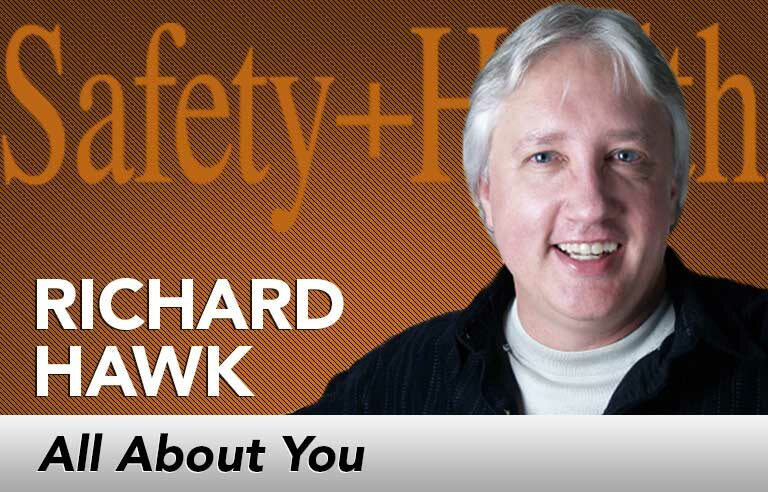All About You: Letting go of regret

EDITOR’S NOTE: Motivating employees to work safely is part of the safety professional’s job. But who motivates the motivator? In this monthly column, veteran safety pro and professional speaker Richard Hawk offers his entertaining brand of wisdom to inspire safety pros to perform at their best.
“I have offended God and mankind because my work did not reach the quality it should have.” Those were the reported last words of Leonardo da Vinci. Even though da Vinci created multiple masterpieces and is considered by many scholars to be one of the greatest geniuses of all time, he still felt regret about his accomplishments.
Regret has been defined as “a negative conscious and emotional reaction to personal past acts and behaviors.” You also can feel it over missed opportunities.
We all experience regret. Sometimes it feels like a quick stab of sharp pain that lasts only a moment. Other times it’s like a toothache that won’t go away.
I’ve felt regret many times throughout my life. I’ve gotten better at handling it (or making it go away), but it still pesters me from time to time.
Regret can be helpful if it spurs you to positive action. If you didn’t study sufficiently for a certification exam and failed it, your regret might drive you to study harder the next time you prepare for the test. If you’re unkind to a colleague, your regretful feelings may move you to apologize.
It’s the regret over things we can’t change or make better that wastes our time and can make us miserable. Here are mental tactics I use – in the form of questions – to eliminate needless regret or improve my behavior.
Did I do it intentionally?
As safety professionals know, a wide gap exists between intentionally causing harm and causing it by mistake. If someone knowingly violates a safety procedure, your reaction will naturally be more severe than if the violation was unintentional. So when you’re feeling bad about something you didn’t mean to do, cut yourself some slack. If it’s something that will never happen again (i.e., a one-time circumstance), consider it closed.
What stopped me?
The time for New Year’s resolutions is approaching. If you made any resolutions last year, statistically there’s a good chance you didn’t keep them all. If one of your major resolutions didn’t pan out, you may feel quite a bit of regret.
Ask yourself what stopped you from accomplishing the goal. Often it’s a personal habit such as watching too much television or some other leisure activity that keeps you from working on your resolution. (I’m an avid pool player, and I know it has cut down on my resolution success rate.)
If it was a personal habit that sabotaged your goal, spend time thinking of ways to address it. Now, rather than dwelling on your “failure,” you’re taking positive action. If it was a circumstance that stopped you, like a new work assignment or having to take care of a sick parent, then let go of the regret – you may have actually achieved more than if you had fulfilled your resolution.
What don’t I regret?
When you consider all that da Vinci accomplished and the quality of his work, it’s odd that he still felt he had failed. Anyone can fall into that way of thinking – focusing on our mistakes and perceived shortcomings rather than our successes.
Instead of dwelling on what you regret, take an inventory of your accomplishments. This year I had hoped to write a book about focusing. It didn’t happen. But instead of beating myself up about it, I think about all the articles, inspiring talks and other projects I’ve completed. You can do that, too. No doubt you’ve done several things this year that have made a difference. So if the “safe lifting” campaign you intended to create in 2015 didn’t materialize, don’t dwell on it. Instead, focus on all the safety meetings, inspections, employee interactions and other work you’ve finished. Surely you’ve done many things that you can feel good about. Take satisfaction in your achievements – you won’t regret it!
Richard Hawk helps companies around the world create more vibrant safety cultures by showing them how to make safety fun. As a professional speaker, author and musician, he also inspires employees to focus better and enlightens safety leaders about ways to increase their influence. To learn more about Richard, visit www.makesafetyfun.com.
Subscribe to the podcast feed in iTunes
Post a comment to this article
Safety+Health welcomes comments that promote respectful dialogue. Please stay on topic. Comments that contain personal attacks, profanity or abusive language – or those aggressively promoting products or services – will be removed. We reserve the right to determine which comments violate our comment policy. (Anonymous comments are welcome; merely skip the “name” field in the comment box. An email address is required but will not be included with your comment.)

